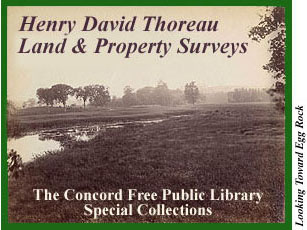 |
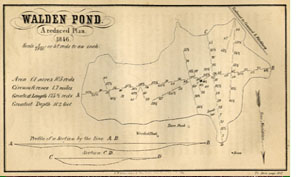 |
Henry David Thoreau (1817-1862), author, philosopher, and naturalist, is best known for Walden, Or Life In The Woods, the account of his two-year experiment in simple living near Walden Pond in Concord, Massachusetts. He also wrote polemical tracts such as “Civil Disobedience”, and nature studies such as “Walking, Cape Cod”, and “A Week on the Concord and Merrimack Rivers”.
It is less well known that his full time profession was land surveying which he saw as an opportunity to pursue his real interest of observing the natural world. He wrote: “Surveying is a noble employment which brings you within hearing of [the birds].” In 1847, in a 10th reunion report to his Harvard classmates, he described his occupation as follows: “I am a School master–a Private Tutor, a Surveyor–a Gardener, a Farmer–a Painter, I mean a House Painter, a Carpenter, a Mason, a Day-Laborer, a Pencil-Maker, a Glass-paper maker, a Writer, and sometimes a Poetaster.” Mostly he worked as a surveyor because he found the work “satisfying and remunerative”.
One of the most interesting of Thoreau’s surveys was the survey of Walden Pond during the winter of 1846. It was generally accepted that the pond was immensely deep, but no one knew how deep. Always challenged by the unknown, he set up a grid on the frozen surface of the pond, dug holes in the ice, and plumbed the pond with a weighted string. Plotting his measurements, he produced a plan of the outline of the pond and a profile of its depth.

No stranger to marketing, in 1849 he had a handbill printed, listing the services he offered and bought a notebook, which he inscribed: “Field Notes of Surveys made by Henry D. Thoreau since 1849.” For the next 10+ years, he did more than 200 surveys. Most were done in and around Concord, but he also surveyed in nearby towns such as Carlisle and Lincoln and as far as Cape Cod, Maine, and Perth Amboy, New Jersey. Thoreau’s last survey is dated December 1, 1860. In the following year he became ill, probably from tuberculosis first contracted in 1835, and died in 1862. When a friend asked him in his last weeks whether he had made his peace with God, Thoreau replied: “We’ve never quarreled”. His heirs donated his survey plans to the Concord Free Public Library where they have recently been processed and cataloged.
LandVest is proud to follow in the footsteps of Henry David Thoreau by providing property owners with real estate consulting and timberland management services that include property definition, valuation, and planning for development and conservation, and estate planning. Thoreau would certainly be intrigued with LandVest’s emerging practice in the valuation and development of renewable energy and environmental assets.
LandVest’s Residential Brokerage Division is frequently working with buyers and sellers of property once surveyed or described by Thoreau. For example, the owners of 35 Sandy Pond Road in Lincoln have a copy of survey work done on their property by Thoreau for Daniel Weston, a large landowner in that area in the mid nineteenth century.
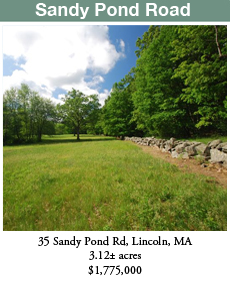 |
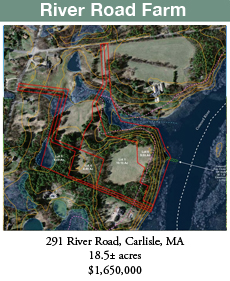 |
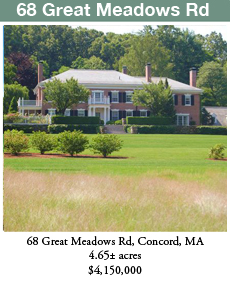 |
Thoreau was most likely familiar with the Garfield Farm on the Concord River in Carlisle. Now known as River Road Farm, LandVest is marketing 18 acres with the potential for three lots. For other LandVest listings in the surrounding towns where Thoreau worked, contact Stewart Young (syoung@landvest.com) who advises buyers and sellers of some of the most distinctive properties in Massachusetts with a focus the Metro West area of Boston and Cape Cod.
“Thoreau, very likely without quite knowing what he was up to, took man’s relation to nature and man’s dilemma in society and man’s capacity for elevating his spirit and he beat all these matters together, in a wild free interval of self-justification and delight, and produced an original omelette from which people can draw nourishment in a hungry day.”
– E.B. White, The Yale Review, 1954
